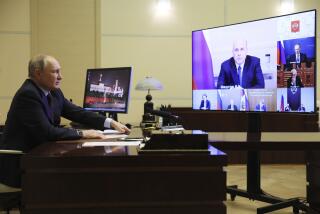Test Ban Treaty and India’s Veto
- Share via
Re “Test Ban Pact Saved From Stillbirth,” Commentary, Sept. 8:
Though the declared nuclear powers may view and accept the Comprehensive Test Ban Treaty (CTBT) as a means of maintaining nuclear security, it is those who argue that a nuclear capability is vital to their national security and feel disadvantaged because of the restrictions a treaty would place upon them that limit the degree to which such a treaty can be effective.
Nuclear security today is much different than it was in the Cold War era. It is no longer governed by the concepts of mutually assured destruction (MAD) and balance of power, or by treaties such as SALT and START. As technology has become more accessible, more countries have begun development of their own nuclear capability. Nuclear security today requires more than a commitment on a piece of paper. To be effective, it will require the efforts of all of the members of the world community, and only by their actions will the world be a safer place.
Though treaties must be pursued, they are obviously not enough to ensure a responsible nation’s security and must be supplemented with the proper defensive measures. Nuclear security must not depend only on a treaty that places too much importance on the rationale of others or that sacrifices nuclear vulnerability to an assumption that the post-Cold War world is now somehow a safer place.
JOHN F. STAMPFLI
Mission Viejo
* Re “Holding Out at the Expense of All,” editorial, Sept. 13:
In recent editorials you have taken to task the government of India for its obdurate stand on the issue of nuclear weapons testing. That criticism is commendable, as is your emphasis upon the need to strive for ultimate abolition of all nuclear weapons (whose mere presence, like a universal sword of Damocles, threatens eventual destruction of all life on Earth).
What you fail to do, however, is to remind your readers that we ourselves--the United States--have been, from the inception of the Nuclear Age, the primary obstacle to preventing a world teeming with these omnicidal devices of destruction.
Their very existence is our doing. And now, putting aside the sorry past, as the world’s preeminent military power, we have the capability--and bear the re- sponsibility--of leading the way out of a potentially terminal tragedy. In this case, truly, prevention is the only cure. Perhaps, in this instance, if the people will lead, the leaders will follow.
HAROLD WILLENS
Los Angeles
More to Read
Sign up for The Wild
We’ll help you find the best places to hike, bike and run, as well as the perfect silent spots for meditation and yoga.
You may occasionally receive promotional content from the Los Angeles Times.






